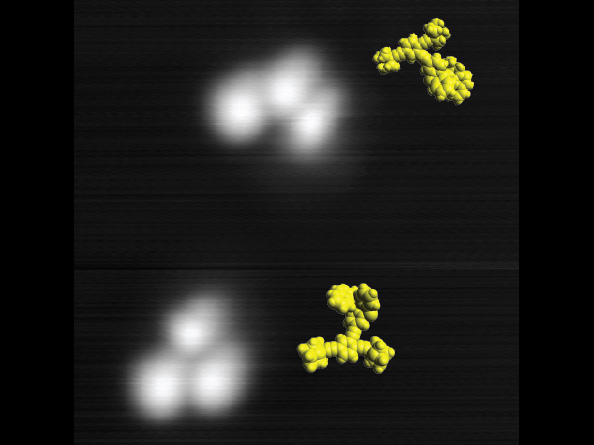Ferngesteuerte Nano-Maschinen, angetrieben von einem Lichtstrahl, reinigen Oberflächen, bringen spezielle Pharmazeutika im Körper an ihren Zielort oder bauen elektronische Strukturen aus einzelnen Atomen. Dieser Zukunftsvision ist die Arbeitsgruppe von Univ.-Prof. Dr. Leonhard Grill vom Institut für Chemie der Karl-Franzens-Universität Graz einen großen Schritt nähergekommen: Dem Team ist es gelungen, einzelne molekulare Maschinen durch Laserlicht gezielt auf einer Oberfläche zu bewegen und währenddessen zu beobachten. Die Ergebnisse der Studie werden in der nächsten Ausgabe des Magazins „ACS Nano“ publiziert und sind online bereits veröffentlicht.
Eine nur zwei Millionstel Millimeter große Maschine mit eingebautem Molekül-Motor hat Leonhard Grill, Leiter der Arbeitsgruppe „Single-Molecule Chemistry“ in Zusammenarbeit mit Prof. James Tour von der Rice University in Houston, USA, entwickelt. „Die große Herausforderung war, die Moleküle anzutreiben und nachzuweisen, dass tatsächlich der interne Motor für die Bewegung verantwortlich ist“, berichtet Grill. Das haben die PhysikerInnen nun erstmals geschafft. Als „Treibstoff“ dient Licht, was gleich mehrere Vorteile bietet: „Damit können wir die Maschinen aus der Ferne aktivieren und außerdem extrem viele Moleküle gleichzeitig bewegen – in Zukunft möglicherweise zum gezielten Transport von Atomen oder Molekülen“, schildert der Wissenschafter. Müsste man die Mini-Motoren für die Energiezufuhr verkabeln, würden sie wesentliche Eigenschaften und ihre Freiheiten verlieren.
In den Experimenten untersuchte das Team mit höchster Präzision die Position einzelner Moleküle auf einer Metalloberfläche vor und nach der Bestrahlung mit Laserlicht. Die Mini-Maschinen legten in einer Stunde Distanzen von mehr als 20 Nanometern zurück. Außerdem konnten die Besonderheiten des Motors für eine selektive Steuerung genutzt werden. „Je nachdem, welche Farbe – also welche Wellenlänge – des Lichts wir einsetzten, konnten wir die Bewegung dirigieren“, so Grill. Diese photochemische Empfindlichkeit ist eine wesentliche Grundlage für weitere Entwicklungen: „Man könnte in Zukunft vielleicht verschiedene Motoren in ein und derselben Nano-Maschine gezielt ansteuern und damit vollkommen neue Funktionen erreichen.“ Das wäre für eine Vielzahl an Anwendungen in der Nanotechnologie und Medizin von Interesse. Molekulare Motoren sind ein äußerst zukunftsträchtiges Feld, das heuer auch mit dem Nobelpreis prämiert wurde.
Publikation:
ACS Nano: „Light-Induced Translation of Motorized Molecules on a Surface”, Alex Saywell, Anne Bakker, Johannes Mielke, Takashi Kumagai, Martin Wolf, Víctor García-López, Pinn-Tsong Chiang, James M. Tour, Leonhard Grill
DOI: 10.1021/acsnano.6b05650
http://pubs.acs.org/doi/abs/10.1021/acsnano.6b05650
Monday, 07 November 2016
